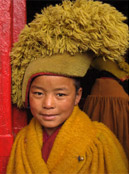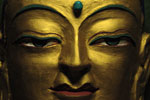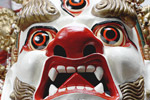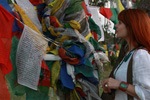Interview with Pandito Khambo Lama XXIV Ayusheev
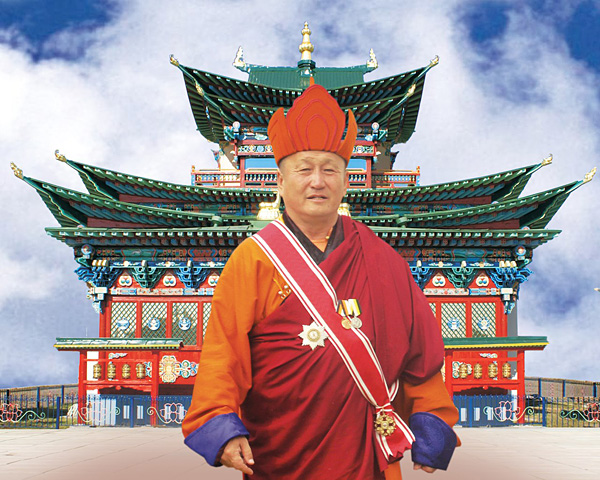
XXIV Hambo Lama Damba Pandido Ayusheev, Head of the Russian Federation's Buddhists.
- Leaving year is significant for the Russians; we celebrate the 70th anniversary of the Great Victory in the World War II. Though Buddhism is considered as one of the most peaceful religions, some people say: “We commemorate the victims of the Great Patriotic War but we never would go to war”. What do you, as the Head of the Traditional Buddhist Sangha of Russia, think about this?
-
In this regard I wish to say that any religion is obliged and must defend itself - this is the first rule. The second rule is if an enemy carried the fight to your house, wherever it is – you must stop him. In the history of Buddhism there were such examples: Buryat Selenginsk Cossack regiments. The lamas served at these regiments as military monks and participated in military campaigns. So, if the war came to your homeland we should protect it. And the Buddhists are not prohibited to do this.
- The traditional Buddhist Sangha has military monks in the troops. What is their activity?
-
The functions of Buddhist military monks, for example Dembel Lama, are the following: the military monks should be always near the soldiers to strengthen their spirit, especially during military exercises. The lamas are always needed in any place where a person is in trouble. I think that the army is one of those places where a person undergoes psychological and physical difficulties. You know that people come to the datsan* when they have some problems. But the soldiers cannot leave their places of military service to come to the datsan.
From this point of view, the soldiers being in harsh conditions during a year are in need of our lamas’ help and we provide them such opportunity. Wherever the Buddhist is, he needs to come to the Buddha and the Three jewels*, to get protection and receive the blessing. It is integral to a human being. For example, even if one Buddhist is in the Arctic and he is told that the lama comes, he would be happy.
- For what purpose do people mostly come to Ivolginsky datsan*?
- Everyone knows that people wish to worship Khambo Lama Itigelov* and tell the others that people come to Him. It is important to know this. There are no any other purposes; nobody can be compared with Khambo Lama Itigelov. In recent years many pilgrims from abroad, for instance from Mongolia, come to the Datsan.
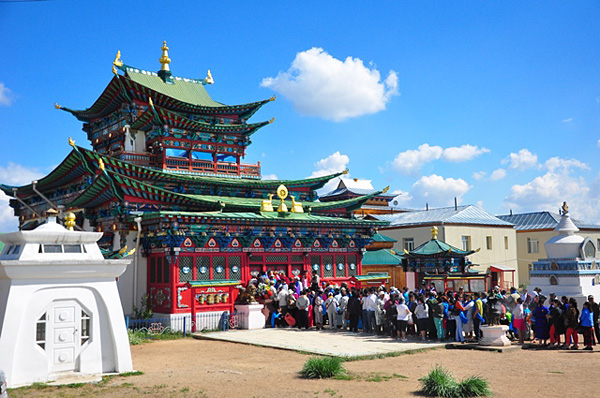
- How can you explain to a common person what does faith mean?
-
Faith is the most important thing in human life. I think that a person who gains faith is somehow in outer space. The man who is absorbed in everyday life does not need faith. And a person who finds faith becomes beyond air space. Once a man gains such state of spirit, he should not forget it. I believe that the faith is the greatest achievement. People are not born with faith. Faith can be gained, not by mind but only by consciousness - that is the difference.
- Can anyone come to faith?
-
Every person aspires to come to faith but often he does not feel it. This is a feeling which should be consciously achieved. For instance, a man came to the datsan and suddenly felt a sense of peace or some extraordinary joy or that something has happened to him. He should understand this state and say: “I felt something, some extraordinary state of mind and consciousness”... And we can call it as a bit of faith.
- Faith and trust are the words of the same root in Russian. What does trust mean?
-
Essentially, this is one and the same.
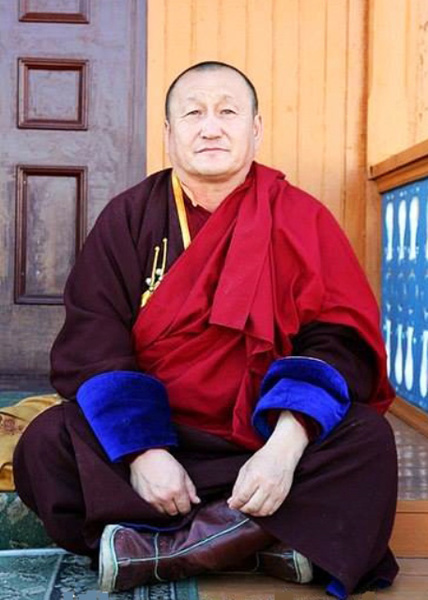
XXIV Pandito Hambo Lama Damba Ayusheev
- Today we remember your words that if even it is difficult for us to trust ourselves, then how we can fully trust someone else.
-
Of course! How can we trust ourselves?! Nobody can be sure that tomorrow he will live. And when people come and say: “Please, believe me!” I reply: “How come?! ”. We must be honest though to some certain extent. It is normal understanding for Buddhist.
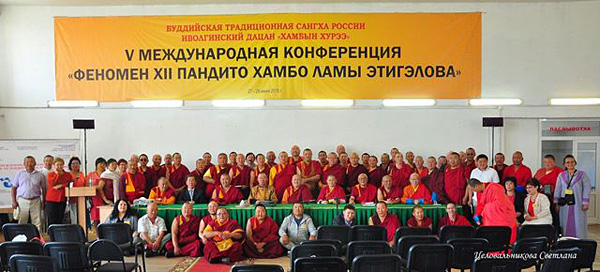
Participants of The 5th International Conference "Phenomenon Khambo Lama Itigelov".
- This summer the Fifth Conference dedicated to the phenomenon of Khambo Lama Itigelov has been hold. Did any new countries take part in it? Please, tell us about the Conference itself. What did you like? What has been changed and which tendencies have been marked?
- Personally for me, the four previous Conferences meant the period of study of the history of Khambo Lama Itigelov and his biography. I was looking for witnesses who could say how Khambo Lama Itigelov lived and for this very purpose four previous Conferences have been held. Today, at the Fifth Conference I have already decided for myself: as a Buddhist, I am not interested in what it was before. I do not care what will happen in the future. I am interested in present day! Therefore, every day I receive Khambo Lama Itigelov’s Teachings through our Bimba Lama.
Khambo Lama demonstrates His abilities to transmit the Teachings to us. We study and comment these Teachings. I think that the Conference should go along this way. There is an actually existing Khambo Lama Dashi Dorje Itigelov, there is an actually existing Choijin Bimba Lama Dorjiev. And it is very important that the words of Khambo Lama Itigelov come to us through Bimba Lama.
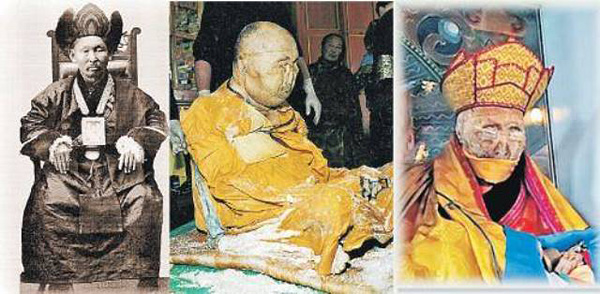
XII Pandito Khambo Lama Dasha Dorjo Etigelov
- At the Conference you asked the participants to view the book with messages of Khambo Lama Itigelov, didn’t you?
-
These are not my words, these are the words of Khambo Lama Itigelov in Buryat language. I just translated them into Russian trying not to lose the sense. It is important to understand that these two languages differ. If I translated it literally, then I would failure. I tried to translate the meaning. Sometimes it happens that when Khambo Lama Itigelov is asked stupid questions and which are, in principle, are difficult to be replied, then Khambo Lama speaks in another way. Here it is necessary to determine whether Khambo Lama answers this very question or He said the other thing.
For example, one Lama reading Khambo Lama Itigelov’s mantra “Om guru sha sa da ra sokha”… said: “The mantra is delicious”. The mantra may be strong, powerful but here it is delicious! It was strange for me; I never heard such a thing that the mantra may be delicious. But Khambo Lama told him clearly: “Feel the taste and take the super power from the mantra”. This is very valuable Teachings! Hundreds of thousands of people will recite the mantra but each man has his own rich imagination and he will try to feel the taste of Khambo Lama Itigelov’s mantra. Then he begins to recite another mantra and will feel the difference between tastes of them. That’s what everyone can feel.
Today I received the message through Bimba Lama: “Nowadays people are joyful and perform acts. Khambo Lama said: “The consciousness of people has priceless value”.
What does it mean? It is impossible to evaluate the consciousness of people. So, here there is a possibility to give a lot of comments from philosophical point of view.
- It is very interesting. Please, tell us how Bimba Lama receives messages.
-
It is clear how he performs rituals but he will not tell how he receives messages, this is his personal experience. I cannot say for him because I do not get such knowledge. There is a certain Buddhist practice of offerings and praise and he performs it but then when he is meditating the other lamas just leave him alone. He comes after a while and says: “Here are the messages!” When I ask him what and how, then he as any other oracle is … beyond logic.
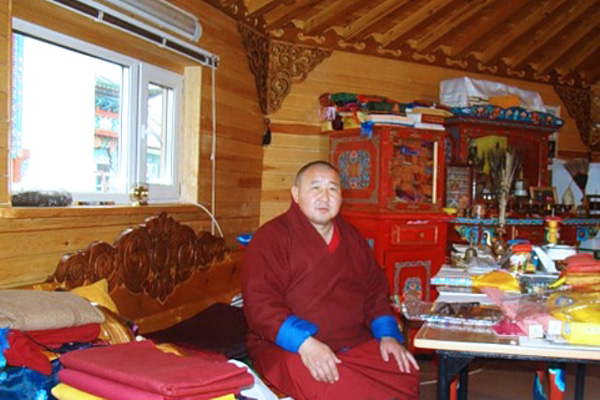
Bimba Lama, he received messages of Hambo Lama Dasha Dorzho Itigelov
But we want to know everything and right now! The funny thing is that when Bimba Lama began receiving messages, 50% of our lamas did not believe him. 10% of the lamas do not believe and will never believe. It can’t be helped! People are pragmatic. There are some people who said straight: “We do not believe”.
I replied to them: “No problems. Sit down and study this yourself!”
But when I tell the Buryats: “Try this yourself”.
He replies:”I do not need this.” Then another question arises: if you can come close to Khambo Lama Itigelov to get his Teachings directly, then - Please, do it!
There are some people who say: “If I cannot do something then no one can do this.” And such understanding is even encouraged in some extent. You know they say that if I do not see something then this something does not exist. This is a backbone of the entire atheism.
Here the point is that Khambo Lama Itigelov gives the Teachings which we all receive and shall work on them. All the rest is empty, minor and unneeded. As for me, the most important thing is that I found the way along which to move. Now this book is issued and you read it. It will be updated each month. Besides, every day I personally publish Khambo Lama Itigelov’s Teachings on Twitter*. There are Teachings which I liked because I understood something. But there are some Teachings which I did not like at all because I did not understood them! (laughing)
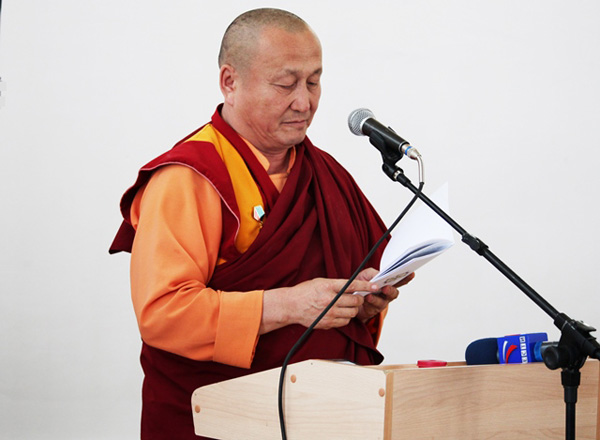
- Which is the greatest mistake for Buddhist to your mind?
-
Lack of watchfulness. For example, when my mother was alive I was not attentive to her. Advertence and observance are good words but they are different ... We must be watchful especially for our mothers and nearest and dearest people. Sometimes we do not finish talking with a person... We say that we were inadvertent or did not pay attention or were not polite. Here we should just say that we were not watchful. This concept includes everything.
The thing is that it was necessary to talk to a person, come to him and spend some time for him. Then later we felt sorry. Nagarajuna said: “A watchful man does not die”. We die of lack of our watchfulness. The most valuable thing is a human life. It is very important for me. Today some young people worry about lack of good luck, the others – about lack of money ... But I say: The greatest mistake is lack of watchfulness!
- This year the Dalai Lama will be 80 years old. How did Buryatia celebrate this date?
- We held the anniversary events. From the Buddhist point of view, the anniversaries are not our business but probably there is no other opportunity to draw attention to this important fact. Nowadays 80 percent of people feel some pietism about their birthdays, especially women. But 20 percent of the Buddhists eschew such tendency. In honor of the anniversary, Alexander Kacharov made the gift: Tankha* of Long Life Deities.
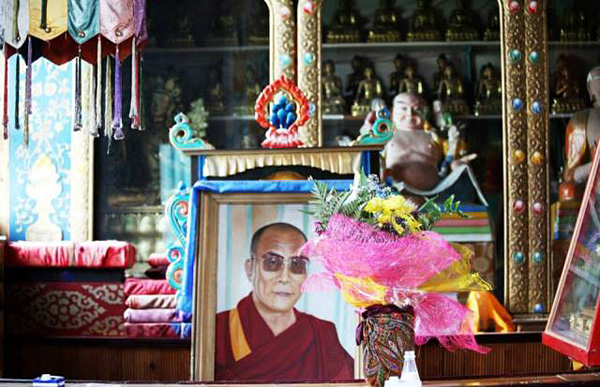
The H.H. Dalai Lama portrait inside Ivolginsky Datsan
- The Buddhism is often divided on the ground of national origin: Chinese, Indian, Tibetan and Buryat. Should we do so?
-
Unfortunately, there are some specifics. For example, take our Buryat people: there are still very strong tribal components in the nation. The Buryats in deferent places have their own dialects, different mentality – it depends on climatic conditions. Or take the Buddhist pantheon: each datsan has its own sahyusan*. Besides, the schools of Tibetan Buddhism also differ in philosophy. One of the features of human mind is to understand the world in comparison and due to this every nation has its own relation to the world and its own mentality.
Some people say that one thing is important for the Chinese Buddhist, the other thing - for Tibetans, the Mongols value one things but the Buryats - the other things, the same is for the Kalmyks, etc. Everyone wants to identify himself; each person has his own understanding. In fact, when the lama deeply understands Buddhism then there is no any difference for him. Unfortunately, there are only about 10 percent of the lamas whose understanding is beyond national differences. However, they are not always understood by the society.
Gaining such knowledge mostly depends on qualities of the person. First, it is necessary to obtain life experience and then keep your mind clear. The Buddhists in Buryatia are mainly young people who are under forty. In 20-30 years these young lamas when achieving their mature age may become such kind of people. At present we are young Buddhists. There was a gap in the period from 1930 to 1970 (40 years) during which nobody taught us and we cannot close such gap right now.
- In recent time, there are ethnic and religious conflicts in the world, for example, in Burma and Sri Lanka. Is Buddhism under the threat of radicalization?
-
We must take into consideration that there is 10 percent of nationalists in every society. If people like radical ideas, then radicalization is possible but if society is reasonable and sound then radicalization is not possible. Everything depends on many things: ailing economy, epidemics, natural disasters, etc. due to which many changes could occur. Everything depends on the balance: who will be at the forefront - nationalists, liberals, conservatives, etc. The society is a living organism and it is constantly in motion.
- They say that each country has its own karma. If a person is born in one country and lives in it, then will he inevitably share the common karma of his country?
- No! This is utter nonsense. Our long suffering Russia somehow believes that it is not so.
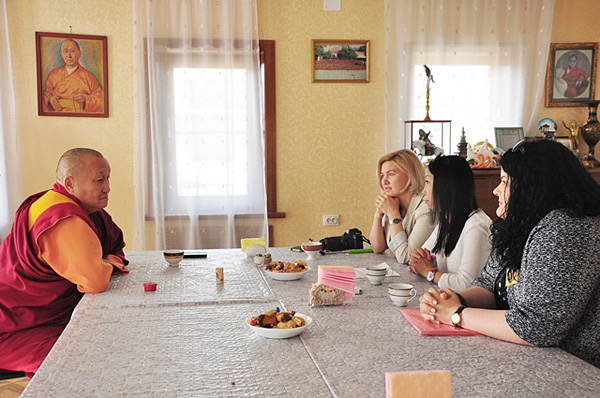
- Not only. For example, there was an earthquake in Nepal and at once there was a view that it is the karma of this country because the Nepalese kill cows. But in the countries where people do not kill cows, earthquakes also frequently occur ... There is such a version that we are punished because “in Stalin's times in Russia there were repressions”. The Buddhists have a popular myth about the karma of a country which says that if you are born in one country, you can do nothing with this but pray.
- I can say only one thing: the lamas of Traditional Buddhist Sangha of Russia do not support such things. If a lama says that the karma of our people and our country is unfavorable, he will be very ashamed for these words. I consider the Buddhism as freedom. For me, as for a human being striving for freedom, there are no any factors limiting or suppressing such freedom. How can I agree with this?!
- Please, tell us about the program “Social Flock”. How is this program developing now?
-
This year only 50% of this program has been realized. We are going to hand out ewe lambs. We can implement this program only next year. I have bought lambs born in 2014, and only in 2016 they will be ready. I am going to hand out about 5000 sheep of 10 000.
- And how will this program be realized in future?
-
According to the agreement, we will give them to the Head of the settlement, for example, one hundred sheep to one Head of each settlement. Once the Head of the settlement gets sheep, the social flock is created and then it should develop. The Head of the settlement shall assume full responsibility for the process. The office of the Head of the settlement is elective one, so each Head of the settlement shall take a flock. You should understand that it's not so easy to take 100 lambs and gratuitously manage them during two years: this work requires certain efforts and capabilities. One of the main problems is that there are very few good shepherds.
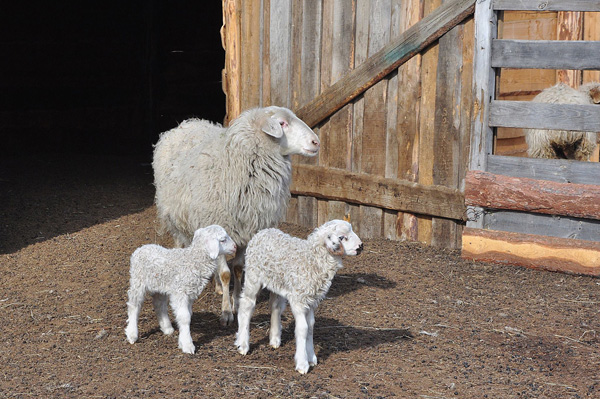
Photo S.Tselovalnikova
- Do people take sheep? Do they participate in this program?
-
Yes, sure! Today about twenty shepherds are already working. Under the terms of the agreement, after a time the sheep owner shall transfer a part of new lambs to others and keep a part of them in his household. If you calculate, this is economically profitable but provided that a person himself manages the flock. However, if you hire shepherds and behave as a little bourgeois, then of course there will be problems. Unfortunately, we can observe such cases.
- Is there any government support, for instance, the grants, especially now after introduction of sanctions and a lot of promises to support small business?
-
No! We do not need this. I would not wish such support; it will be like narcotic drug. For example, a man manages a hundred sheep, so what? Does it mean that each man will receive a subsidy for this? If a person has a flock, he is already a rich man. Money should be spent to prepare a new farmer. Usually we have the following situation: if a man manages a hundred sheep and achieves good results, they give him a subsidy but giving money to others means a certain risk. Today unfortunately, people do not trust their fellow countrymen. As a rule, they hire migrant workers. It is more profitable. The situation with fellow countrymen is complicated because such fellow countrymen do not eager to work. There is some psychological component in this matter. In addition to the social flock itself, it is necessary to have strong will! Only this will help us.
- What do you advise to the audience of Tibet House?
-
Continue to work! From historical point of view we need to establish diplomatic relations with Tibet. Tibet is a huge world. There should be persons who will study this nation, culture and civilization. Each nation in the world has the right to have its swore brothers and representative offices in other places of the world. And the country which considers itself as self-sufficient and self-respecting state, such country has a diverse audience which takes interest in Tibetan medicine and yoga, or Spanish dances, etc.
Such interest clubs should exist. What does this mean? It means that the nation, the country, is great and strong and it takes interest in people. All countries and peoples of the world should have representative offices in Russia. There are nations which are significant for the world. The Tibetans spread the Teachings of Buddha all over the world and they preserve and develop it. They are worthy of respect and honor in Russia to recognize and accept them.
- The Indians are very passionately treat their culture. This year UNESCO set up the International Day of Yoga which is widely celebrated in many cities in Russia and around the world.
-
If you do not promote your idea, it turns out that you mean nothing. For example, the idea itself of Khambo Lama Itigelov’s Teachings should go ahead. This idea should not exist only here. Why do we hold the Conference? We have Khambo Lama Itigelov’s Teachings which we are going to transfer to people. Besides, we have already the Teachings of the Buddha, that of Bogdo Tsongkhapa and we know the Teachings of Nagarjuna.
We know the Teachings of the great thinkers. And we are proud of this! There are people who take interest in Tsongkhapa or Nagarajuna, Asanga, Tilopa or those who worship Padmasambhava. Along with them, now we have the Teachings of Khambo Lama Itigelov and these Teachings should move on through the world. Rabindranath Tagore said: “Each nation must present to the mankind all the best which it possesses and thereby enrich the mankind”. At present, we enrich the Buddhist world with the Teachings of Khambo Lama Itigelov. This is our heritage, our self-respect and our pride!
I would like to finish our interview with the words of Mahatma Gandhi: “The past is a good lesson which we should not forget. The present time is an opportunity. The future is a gift.” Every day I receive a gift from Khambo Lama Itigelov and have opportunity to use it. Today, at the Conference in honor of Khambo Lama Itigelov, all three times – the past, the present and the future, have been gathered together. Watch carefully the essence of the Teachings, study them and start to use them.
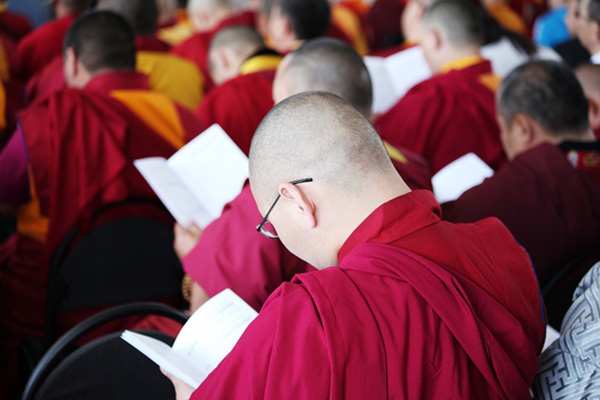
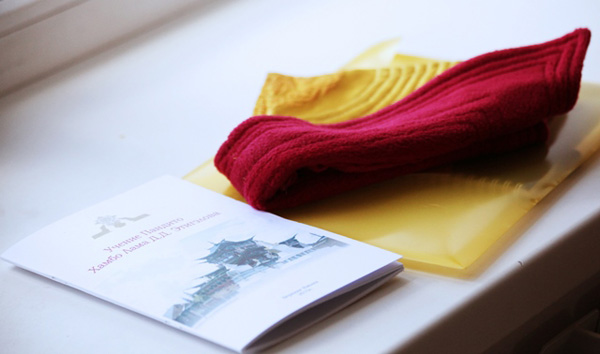
- Thank you for your hospitality and meaningful interview.
Footnote:
* Sangha (sanscr.) – Community of monks
* Datsan (Buryat) – Monastery
* Three Jewells – Buddha, Dharma, Sangha (sanscr.) – Buddha, Buddha’s Teaching and community of monks
* Ivolginsky Datsan
* Khambo Lama Itigelov Dashi Dorjo
* Pandito Khambo Lama Ayusheev’s Twitter https://twitter.com/DambaAyusheev
* tangha (tib.) – a painting on cotton
* Sakhyusan (buryat) – Protective Deity
The interview was conducted by Tuyana Tsrenzhalova, Ekaterina Kosenko and Nadya Berkengeym.
©Tibet House in Moscow
![]()
![]()
![]()
![]()
